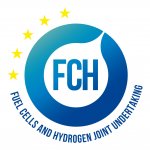Polish teacher Mrs. Katarzyna Wyborska talks about her involvement in FCHgo and the project pilot phase in her school.
With the development of FCHgo teaching materials being almost finalized, the next phase of the project is about to start. After the summer break each of the national FCHgo partners is going to test the toolkit in selected classrooms of their country.
To provide a more detailed picture of how the FCHgo pilot classroom activities will be organized, the FCHgo communication team talked to Katarzyna Wyborska, one of the teachers who will open her classroom for the FCHgo toolkit tests. In this interview Katarzyna speaks about her experience on teaching STEM subjects and what she expects from FCHgo.
FCHgo is your first science project dealing with hydrogen and fuel cells technology. What is your motivation to participate in FCHgo? Today’s rapid development of scientific knowledge and new technologies poses new challenges to the teacher. We need to keep up with the changes in order to be able to equip young people with key competences that will allow them to respond to the needs of the market economy.
The FCHgo project is my first science project with pupils. Undoubtedly, it will make a huge contribution to the teaching of energy in primary schools, the more I am glad that I am part of it. For the proposed innovative teaching concept will inspire teachers and their pupils to deepen their knowledge about climate change, renewable energy sources and hydrogen technology.
Hydrogen energy is a subject that is, if at all, usually treated in high school only, not in primary school. In your view what can pupils at age 8 to 10 learn about the subject?
Yes, it’s true, primary school curricula do not contain information about hydrogen energy yet. That is why the role of the teacher here is so important in order to place respective content in didactic plans. The implementation of the FCHgo project allows this, giving the opportunity to integrate the teaching of hydrogen energy in a primary school. The goal is to present hydrogen and accompanying complex physical processes to the youngest in an accessible, clear and understandable way, going beyond the framework of the proposed curricula.
How will the pilot implementation phase of the FCHgo toolkit look like in your classroom?
At the school we will conduct pilot classes about hydrogen technology in the form of a lecture and workshop for students aged 8 – 15 years. Teachers participating in the project will receive an introduction into the age-appropriate teaching materials of the FCHgo toolkit. During the implementation of the program, we will keep discussing work methods and teaching content. The didactic materials used during the lesson (scenarios, animations, films, stories…) will help teachers to explain the physical and chemical phenomena occurring during the operation of a hydrogen fuel cell.
Obviously, the materials will be adapted to the age and abilities of pupils. For the youngest group of pupils, we will show and explain issues related to energy and its transformation, in an accessible and the easiest possible way. We will answer the most frequently asked questions by pupils: What is hydrogen?, Where does it come from?, How can it be used? … After the theoretical introduction, we will conduct simple experiments that show how the process of generating electricity in a fuel cell looks like. In order to achieve the best results, we are going to use active teaching methods to stimulate pupils’ curiosity and encourage them to think creatively.
Is there one aspect or material of the FCHgo toolkit you are in particular curious about how it will work in class?
Understanding the basic principles of the fuel cell operation, the resulting benefits for the natural environment and promoting attitudes and activities conducive to social development related to ecology are undoubtedly an important aspect of the FCHgo project. For me as a physics teacher, workshop activities will be an exciting element of the project. The classes will allow students to learn about pure non-coal energy. I am looking forward to satisfying their natural curiosity by showing that they can use the energy converted in a fuel cell.
Speaking from your experience as a teacher: What do you think is essential for boosting children’s interest in science education today, in schools and beyond? What advice would you give a teacher with less experience in this matter?
Any additional initiative of teachers is conducive to the development of pupils. Promotion of interest in science is important for society and should therefore be an inseparable element of teaching. Teachers and their involvement are key for motivating pupils to learn. Having a significant role in satisfying pupils’ needs and expectations, we should take care of an attractive educational offer. In today’s rapidly evolving world, traditional methods are no longer effective. Thereofore, we must reach out to pupils differently. Running interest groups, taking pupils to didactic shows and participation in STEM projects like FCHgo, will help them develop various key skills, while showing them science subjects as interesting and future-oriented.

Interviewee Information
Katarzyna Wyborska teaches physics and chemistry at the primary schools in Dąbrowa Biskupia and Ośniszczewko. Since graduating from the University Nicolaus Copernicus Torun with a MSc. Degree in physics education in 2012, Mrs. Wyborska is a regular participant and host of NCU science outreach programmes. FCHgo is the first European project she contributes to, not only as participant, but also as an advisor. She is a member of the project’s international stakeholder community, sharing her experience as a teacher and providing expert advice on the didactics of the FCHgo materials as well as the implementation of the pilot phase.



